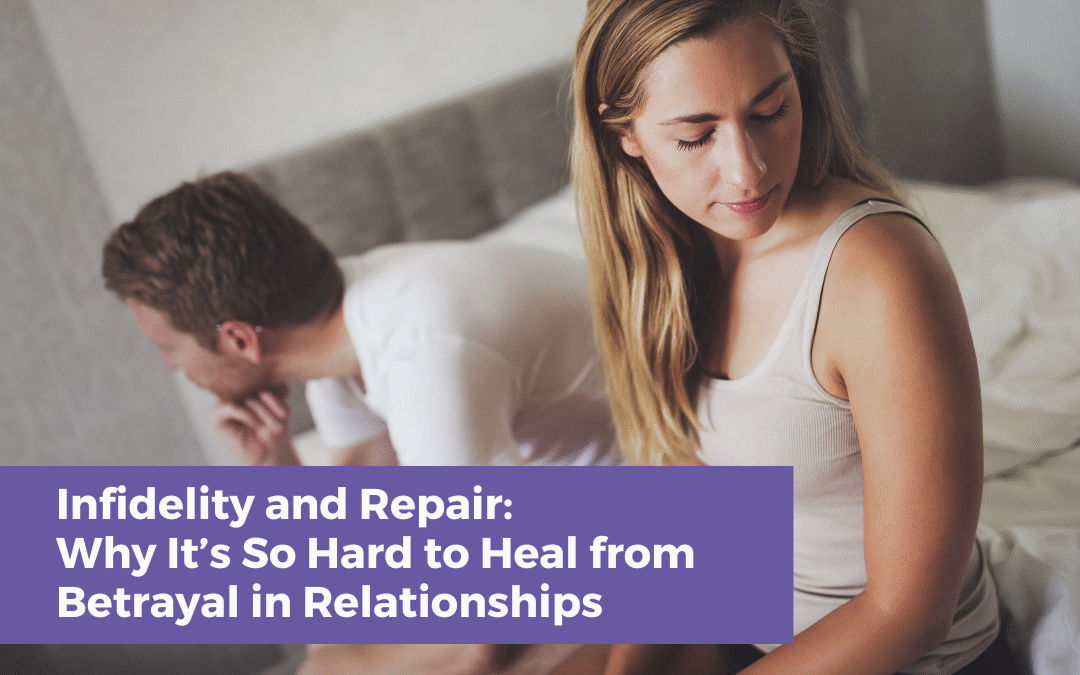Infidelity is one of the hardest things I see in my work as a couples therapist. It’s raw, messy and full of strong emotions. People feel confused, lost, scared, overwhelmed, and they don’t know what to do. They don’t know if they want the relationship to work. They don’t know how to move forward. And it’s hard. It takes time. It might not happen as quickly as one person wants and that adds another layer of frustration.
I recently recorded a podcast episode about infidelity and why we’re so obsessed with other people’s affairs.
Affairs bring up big feelings. Guilt. Shame. Blame. The betrayed partner might be months down the track and suddenly find a text message or photo that triggers everything again. For the partner who had the affair, even a simple question can bring on a full shame spiral. It is complicated.
In the episode, I talk about how we use other people’s stories to figure out what’s acceptable in our own lives. That’s called social referencing. We watch how others behave and see how people react to them. It helps us decide what’s ok and what’s not.
“We’re using someone else’s experience to figure out what we think and how we might respond if this happened to us.”
There’s also this idea that if you leave your relationship for someone else, things will be better. But that’s not always true. What often happens is you take yourself with you. The stuff that was hard in the old relationship shows up again. Unmet needs. Conflict avoidance. Communication problems. They come back in new forms.
An example could be someone who was in a relationship with a quiet, introverted partner. They liked how steady and reliable that felt at first. But then it started to feel flat. They wanted more fun, more energy. They started going to the gym and met someone warm and outgoing who laughed at their jokes and remembered their name. It felt exciting. Validating. Like finally being seen. So they left the relationship and started something new. Six months later, they’re arguing about housework and feeling misunderstood. They start to wonder if they made a mistake.
That’s the thing, patterns follow us. In Gottman therapy we talk about perpetual problems. About 70 percent of issues in relationships are ongoing. We don’t fix them, we learn to manage them and changing partners doesn’t erase that.
Can relationships recover after infidelity? Sometimes, but it takes work. Recovery is not about going back to how things were. That version of the relationship is over. You need to build something new.
In Gottman therapy we talk about three phases: atonement, attunement, and attachment. Atonement means taking full responsibility without excuses. Attunement is looking at the emotional climate before the affair. What needs were missed or never spoken about? Attachment is about rebuilding closeness and creating shared meaning again. This process takes time, honesty, and emotional safety. Most couples need professional support to work through it.
If you’re the one who was cheated on, you might feel like your whole sense of self has been rocked. You start questioning your memory, your instincts, and your boundaries. You may feel like you’re going mad. Therapy can help reconnect with your values, make sense of what happened, and decide what kind of relationship you want moving forward. With your current partner or someone else.
And then there’s shame. I talked about this in another episode of the podcast with guest Michael Derby.
We spoke about how shame lives in the body. It’s not just a thought. It’s a full-body experience that can shut you down and make you feel unworthy or unlovable. When someone has an affair and is caught or comes clean, the shame can be overwhelming. For the person who was betrayed, shame can come up too. Thoughts like, “How did I not see it?” or “Was I not good enough?”
In that episode, I said, “Shame makes you want to hide. But what we actually need in those moments is connection and support.”
Both people in the relationship are usually carrying shame, but it looks different. And without recognising that, couples get stuck in cycles of blame and withdrawal.
If this is something you’re going through or want to understand better, the podcast goes into more detail and might help you think through your own experience.
🎧 Listen to the podcast
🎧 Listen to the shame episode with Michael Derby
💬 Want to ask a question or suggest a topic? Reach out here.









Recent Comments